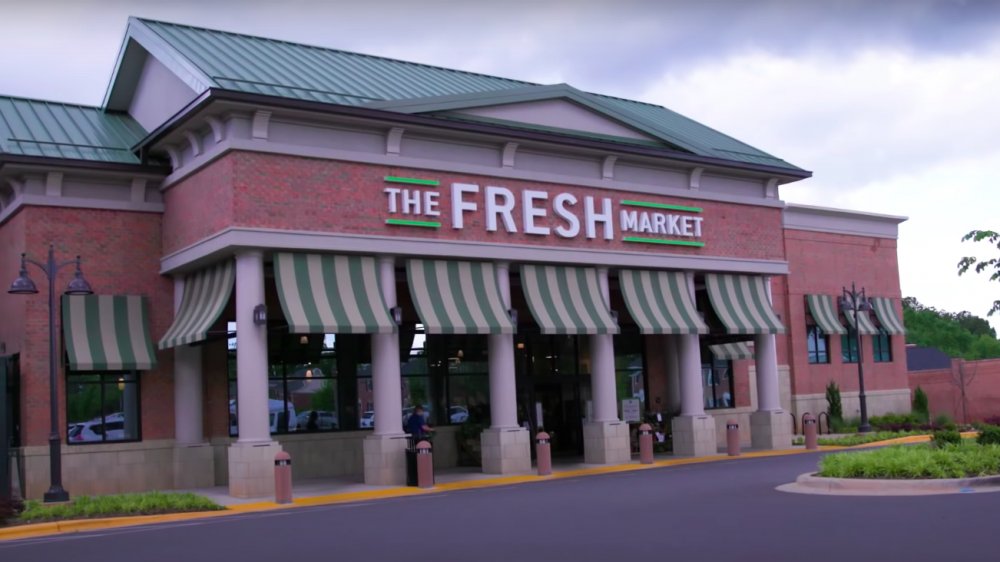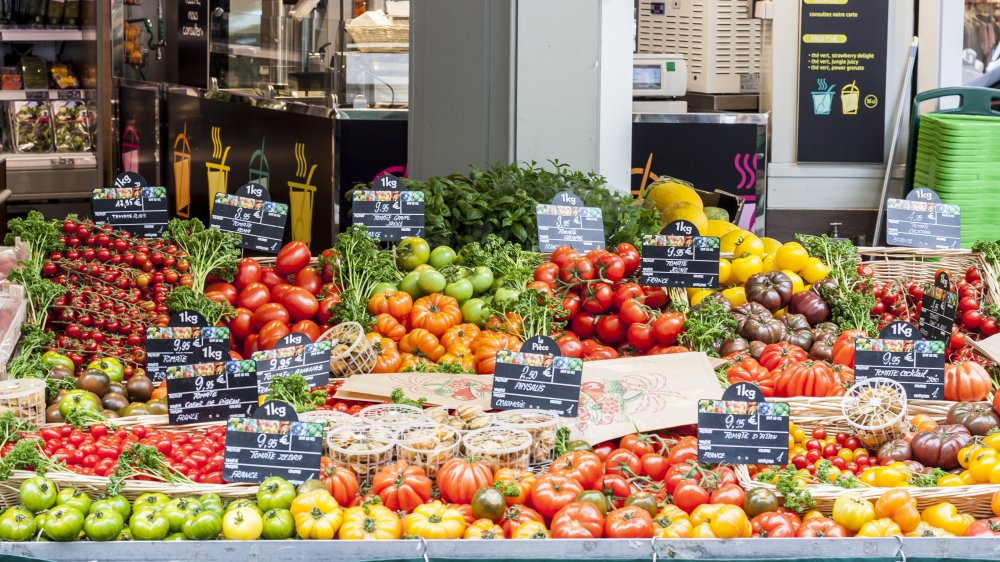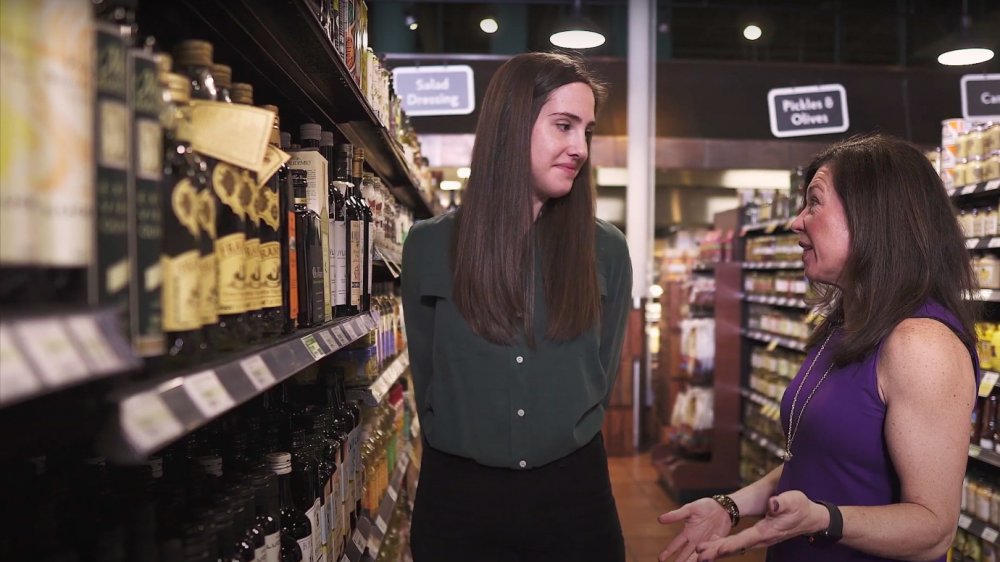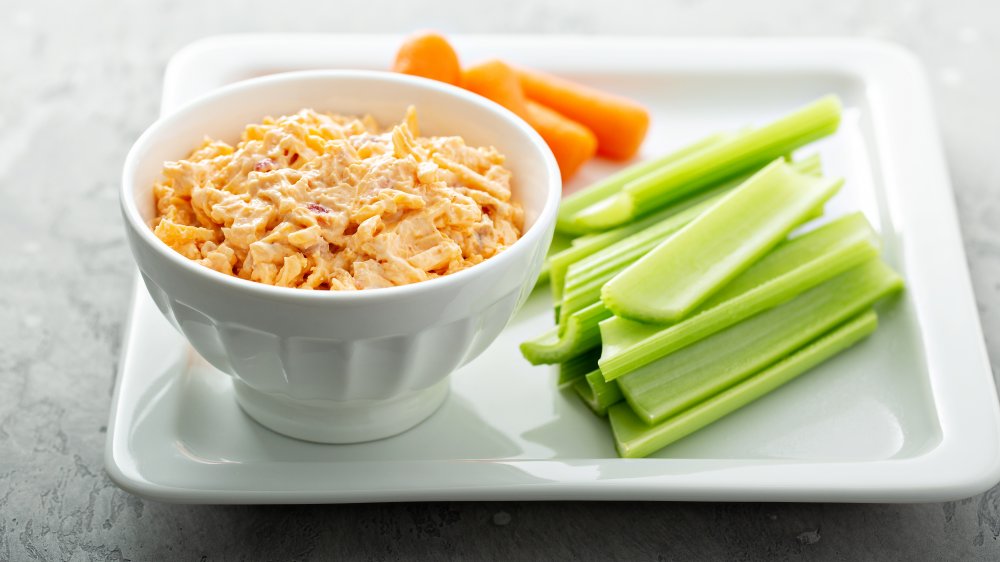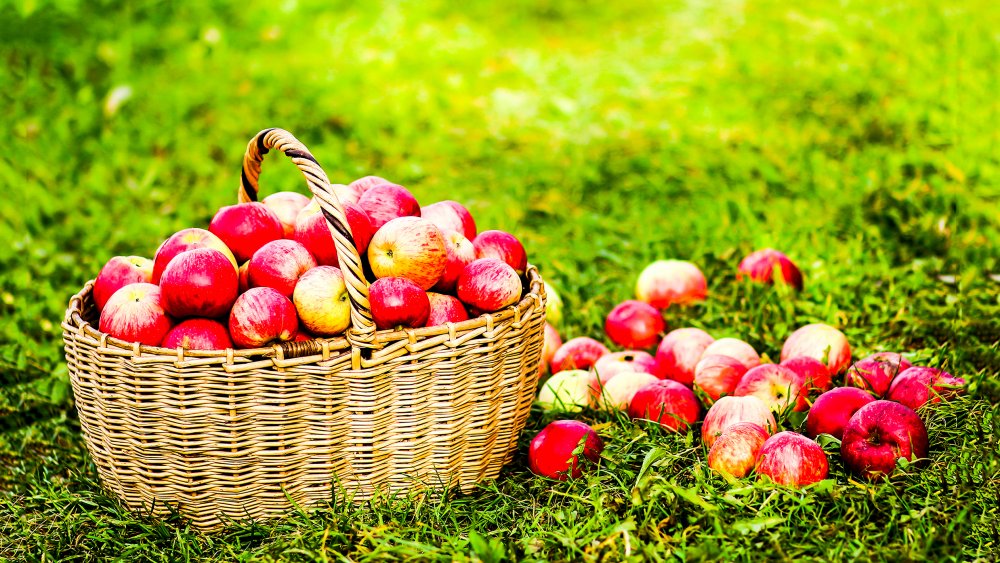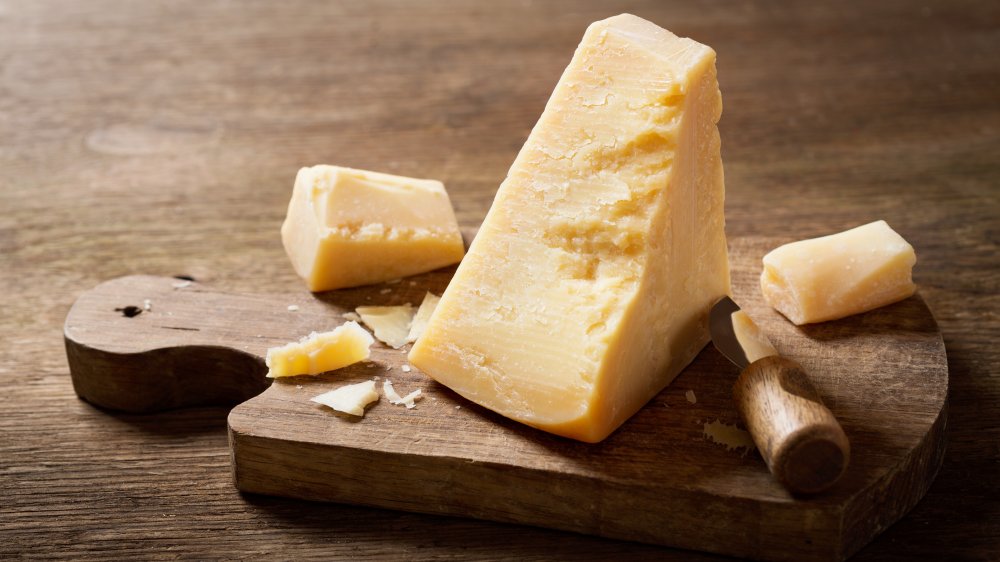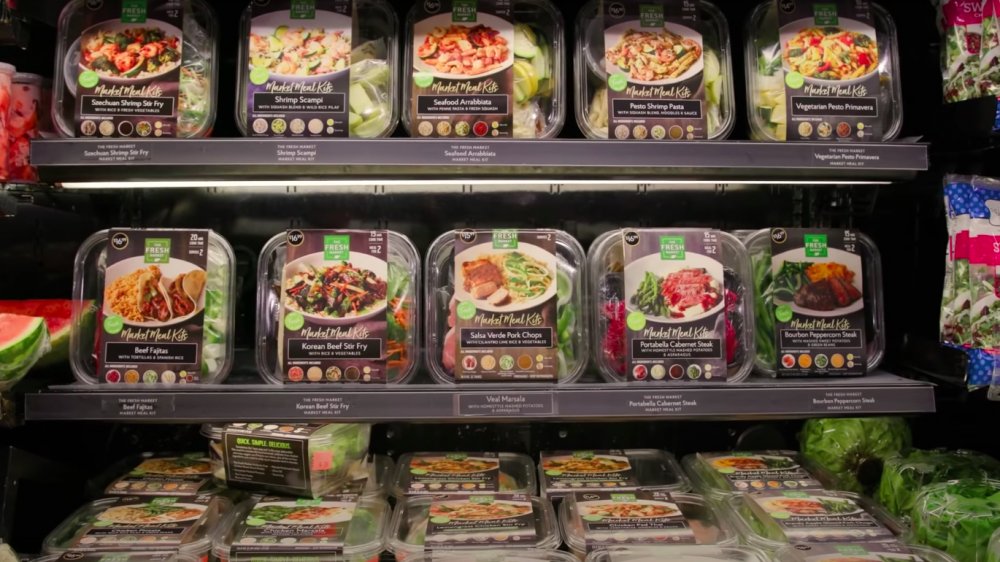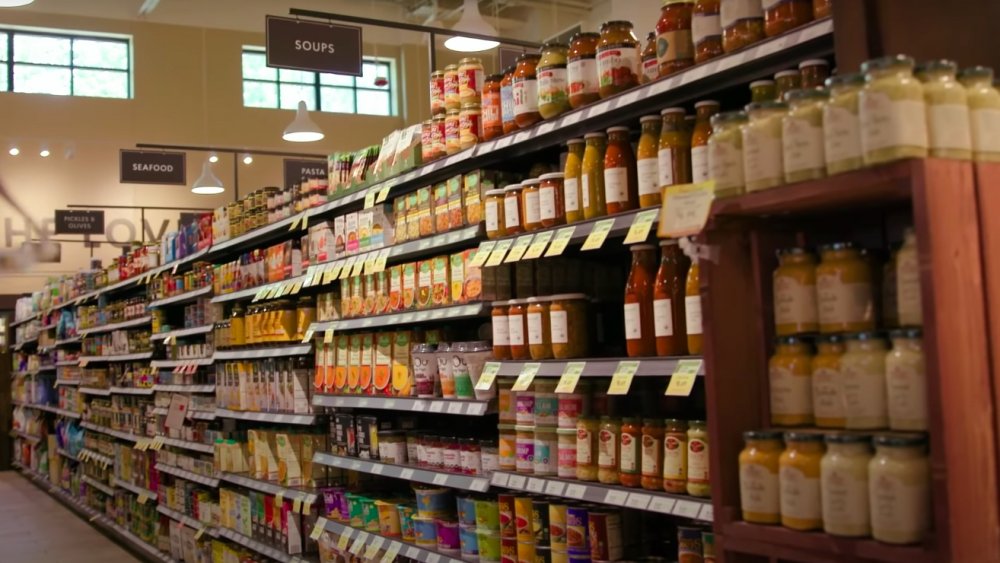The Untold Truth Of The Fresh Market
If you shop at The Fresh Market (not to be confused with Fresh Market), it is very likely that you'll step out with a bunch of food items you had never even heard of before. The North Carolina-based specialty grocer aims to provide its customers a "treasure hunt" experience, exposing them to products sourced both locally and from around the world.
The stores are filled with curious produce like jackfruit and purple cauliflower and feature olive oil and balsamic vinegar stations where you can refill your bottles. Dim lighting and classical music set the tone while customers pick out any number of items from the ready-made meals section, bakery, butcher counter, or the large fresh produce section, which contains fruits and veggies from local vendors. "We aren't looking to be a natural grocery store, we are looking to be a specialty store," said Larry Appel, CEO of the grocery chain (via Business North Carolina).
The Fresh Market Stores, with their carefully curated private label brands, high-quality prime beef, and local organic produce, target middle to upper-class families. In his 1991 book Marketing Channels, business professor and author Bert Rosenbloom explained that the target market for The Fresh Market includes "educated high-income consumers in wealthy neighborhoods". Still, the open European market-inspired chain faces stiff competition from big players such as Whole Foods, Kroger, and Walmart. But that's not to say it can't thrive. Here's a look into The Fresh Market.
A trip to Europe inspired the founders to open The Fresh Market
In 1980, a man by the name of Ray Berry decided to leave his job in which he oversaw 3,600 7-Eleven stores for The Southland Co. (now 7-Eleven Inc.), according to Greensboro's News & Record. After quitting his job, he and his wife, Beverly Berry, moved to Greensboro, North Carolina, and started a grocery store in line with the look and feel of the European food markets they had seen during their visit to the continent. Markets such as the Saint-Quinten Market in Paris had, and still continue to have, bistros, vendors who sell locally-sourced fish, butcher shops, and separate spaces for organic produce and flowers, as explained in Bonjour Paris.
According to The Fresh Market's website, Ray and Beverly used all their personal savings to start their dream store on Lawndale Drive, offering "locally-grown produce, bins of freshly roasted coffee, an old-world style butcher shop and fish market, in-store bakery, fresh cheeses and cured meats, and floral stands". The store was small (14,000 square feet) compared to the supermarkets that saw a boom post-World War II. The Fresh market opened just a year prior to the 1983 opening of the first Costco and Sam's Club stores, which both offered bulk-sized discount shopping.
The Fresh Market works with food curators
If you thought curators only worked in museums, well, we have news for you. At The Fresh Market, there is a specialty food curator for each department — from grocery to produce to cheese and so on. The video series Meet the Curators launched by The Fresh Market in 2019 introduced shoppers to some of the curators at the chain, such as certified olive oil expert Emily Reass, who shared tips on how to pick the best quality olive oil, and meat and seafood expert and director Peter Mayes, who gives a peek into the store's specialty meat offerings, like prime beef.
The company, with help from 25Madison — a New York City-based venture studio that invests in and assists startups — analyses food trends to plan new products in their stores. According to Supermarket News, The firm "[identifies] early-stage consumer companies and brands that could disrupt or create market trends" and helps The Fresh Market stay up to date.
Based on this data and the data gathered from food trade shows and interaction with vendors, the food curators source products months before they hit the store shelves. Analyzing the trends and then acting on them has proved to work for the company. Plant-based foods such as cauliflower pizza and beverages such as kombucha, which were added based on the trend forecast in 2019, performed well in stores, according to the report in Supermarket News.
Pimento cheese and The Fresh Market go way back
In 1983, founder Ray Berry's family pimento cheese recipe — made with mayonnaise and pimentos — was introduced to The Fresh Market stores, thus becoming the store's first-ever private brand label, according to Perishable News. By 2016, 11 million pounds of the spread had been sold in The Fresh Market stores, the company revealed. In fact, the product is so popular at The Fresh Market stores that the company decided to declare April 9 as National Pimento Cheese Day in 2016 and organized a line-up of cheese tastings and food demonstrations at their stores.
Since debuting its pimento cheese product, the store has vastly expanded its private label segment to include over 1,500 perishable and non-perishable items in its stores. Some of the popular ones are Nom Nom Salsa sourced from a vendor in Georgia and gelato and panettone imported from Italy, according to Winsight Grocery Business.
Right from its inception, the specialty store has thrived in partnering with local organizations and chooses to reserve valuable shelf space to feature all its locally sourced products. Some of the brands The Fresh Market featured in its stores when they were just starting out have gone on to become mainstream successes, like Back to the Roots, a company that sells mushroom kits, and Charlie's Soap, a non-toxic and all-natural detergent soap company, per Winsight Grocery Business.
The Fresh Market offers more produce options than a traditional grocery store
Despite the smaller footprint of The Fresh Market stores, the retailer offers three times the variety of produce than a traditional grocery store, according to their website. And you can be sure that produce is more than good enough to eat. "Rather than having fruit picked just before it is fully ripe and then shipped on a boat, we will pay the extra freight cost to have the fruit flown in, so it is in our stores in the shortest amount of time after harvest," Dennis Payne, senior category manager of produce retail, explained in a press release. It is particularly important that fruits such as cherries and grapes are left to ripen fully before picking them as they, unlike bananas or avocados, do not store any starches that would later convert into sugars. "An example is when we offered cherries from Tasmania, Australia in the winter, when you normally do not get to enjoy them fresh," Payne continued.
During apple season, The Fresh Market stocks up 15 varieties of apples and in the summer, 14 varieties of melons. Certain hard-to-find tropical fruits such as jackfruit, rambutan, lychees, and cotton candy grapes are also made available when in season.
In Fall 2019, the grocery chain offered not just seasonal produce, but more than 60 pumpkin-flavored items, including pasta sauce, salsa, coffee, cookies, hot cocoa, snack mixes, yogurt-covered pretzels, and bakery items, according to Supermarket News.
The Fresh Market stocks a wide array of imported foods
Almost every department of The Fresh Market features a generous offering of imported food products. We're talking jumbo blueberries from Peru, watermelon-basil and elderflower-flavored sparkling waters from Australia, switchle from the United Kingdom, holiday cookies from Germany, and winter glögg from Sweden.
To curate a collection of Italian cheese at The Fresh Market, the grocery chain's head cheese buyer Andy Harvell himself visited several Parmigiano-Reggiano plants in the Parma region of Italy to decide on the perfect one to bring back to the store shelf. The choices were narrowed down to eight producers, each of whom sent their 85-pound cheese wheels to The Fresh Market headquarters for the team to taste and decide. While the tour did help add a new product to The Fresh Market's stores, it also inspired the Italian Heritage Month celebration in October 2019, in which the company highlighted its list of Italian imports that include pasta, sauce, pizza, and gelato among others, Winsight Grocery Business detailed.
The Fresh Market makes home-cooked meals easier
For those who don't feel like cooking but still want to have a healthy home-cooked meal, The Fresh Market offers Market Meal Kits. Similar to a subscription service like Blue Apron or Home Chef, each kit includes all the ready and prepped ingredients — all sourced from the store —that you'll need to create a delicious meal. For example, the grocer's Beef Fajita kit includes sliced green peppers, onions, fajita sauce, ready-to-heat rice, tortillas, and beef strips. Sautéing the veggies and beef and readying the final plate shouldn't take more than 20 minutes, according to the company's website.
The Fresh Market also offers "Little Big Meals" that are easy to prepare and "come with a choice of protein, vegetable sides and accompaniments such as sauce, bread or dessert," as highlighted in Winsight Grocery Business. As of this writing, The Fresh Market's Little Big Meals retail for $20 each and serve four.
The Fresh Market's weak name has lead to some confusion
The Fresh Market is clearly not the most unique name for a grocery store, especially when you consider how many other "fresh markets" are out there, like Pete's Fresh Market, Cermak Fresh Market, and Garden Fresh Market, to name just a few. To make matters more complicated, all of these stores provide similar services to The Fresh Market.
In 2005, The Fresh Market requested the federal court in South Bend, Indianapolis, to prohibit one grocer, Arthur's Fresh Market, from using the name "Fresh Market" as it might create confusion among customers. However, the court ruled against The Fresh Market, stating that "the Fresh Market trademark is descriptive and therefore weak and not entitled to broad sweeping protection" (via Progressive Grocer). In 2010, things got complicated once again when Salt Lake City-based Associated Food Stores opened up the very similarly named chain Fresh Market. Finally, in 2017, the North Carolina-based grocer had "The Fresh Market" trademarked by the United States Patent and Trademark Office.
The Fresh Market has an extensive list of booze-free beverages
In 2019, The Fresh Market curated a non-alcoholic beverage aisle, offering some 70 new brands, and 300 new products, according to Euromonitor International. These new alcohol-free drinks included adaptogenics (drinks that contain natural herbs and help relieve stress), non-alcoholic beer, and wine-inspired waters, according to a press release on the company's official website.
The company offered never-before-heard-of brands such as Asarasi, which sells organic sparkling water sourced from maple trees, Richard's Rainwater, which is essentially rainwater in a bottle, and Napa Hills Vineyard Enriched Waters, which is like wine but without the calories or alcohol. The Fresh Market told Supermarket News that it was the first retailer to bring specialty lemonades and sodas "from across the pond." These drinks include artisanal lemonades from France and the U.K.-based Bottle Green Sparkling sodas.
The addition of this extensive list of non-alcoholic beverages follows the trend forecast released by The Fresh Market for the year 2020, according to which non-alcoholic beverages, low-sugar, and seed-based products will perform well in the market.
The Fresh Market was rated one of America's most hated companies
Although The Fresh Market has a lot going for it, a 2018 24/7 Wall St. report named the grocery chain one of "America's most hated companies." The outlet came up with its rating system after reviewing news events, customer surveys, employee reviews, and brand value from the previous year. The Fresh Market, though known for its extensive offerings of fresh produce and healthy food products made the list alongside companies such as Johnson & Johnson (which has faced several lawsuits for allegedly putting its consumers at risk) and Purdue Pharma (accused of playing a role in opioid crisis).
"[The Fresh Market] is rated as the worst place to work among major employers, according to [1,600] Glassdoor reviews," 24/7 Wall St. reported. In addition to the company's 2.2 star rating, only about 25 percent of employees said they would recommend the company to their friends and only 21 percent "had a positive outlook for the business."
Based on over 7,000 interviews conducted between May 2019 and May 2020, YouGov published a report that cited The Fresh Market pretty low on the list — 13th — of popular grocery stores, far below its competitors Whole Foods and Trader Joe's. According to the data, only 34 percent of those interviewed had a positive opinion of the store, compared to 54 percent for Whole Foods and 61 percent for Trader Joe's.
After 34 years, The Fresh Market finally started selling toilet paper
In 2016, some six years after going public, The Fresh Market was taken over by Apollo Global Management for a whopping $1.36 billion. This, Charlotte Observer suggests, was due to the "[pressure] by national chains like Walmart and Kroger, and such rivals as Whole Foods and Trader Joe's".
Since the buyout, the grocery store underwent a complete makeover. The prices of many of its items across the store were lowered and almost 1,300 new items such as baby products and cleaning supplies were added to the inventory. For the prior three decades, the grocer was known only for offering specialty food, according to another report by Charlotte Observer. But for the first time in over 30 years, customers could step into The Fresh Market and walk out with a roll of toilet paper, Winston-Salem Journal reported in 2016.
Besides the changes in the selection of products, the physical store itself went through a few updates. The signature low bins with bulk candies and coffee were removed and replaced with more traditional vertical aisles. The antiques that were part of the store decor were replaced with food photos, the music within the store changed from classical to jazz, and the lights which were otherwise dim turned brighter.
The Fresh Market returned to its roots
After pivoting from a specialty grocery store to more of an all-purpose store between 2016 and 2018, The Fresh Market actually decided to take a sharp U-turn and return to the ways of the past. Under CEO Larry Appel, who was appointed in late 2017, the company shuttered 15 of its stores in 2018 and launched just one new store that year, so as to prioritize its growth in stores that were already performing well. The company had 186 stores in 26 states in 2016, but by 2020 The Fresh Market operated 161 stores in 22 states.
Appel told The Charlotte Observer that the company decided to "[get] back to their roots as a European market and as a specialty market." While The Fresh Market faces stiff competition from Kroger, Walmart, and Whole Foods, among other grocers, the initiatives taken since 2018 have shown modest improvement, according to a late 2019 report from Moody's Investor Service (via Winsight Grocery Business).
